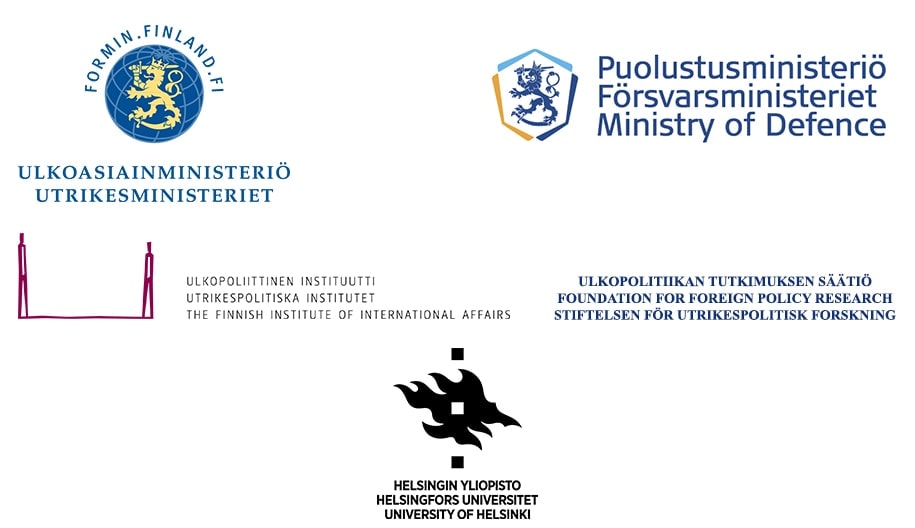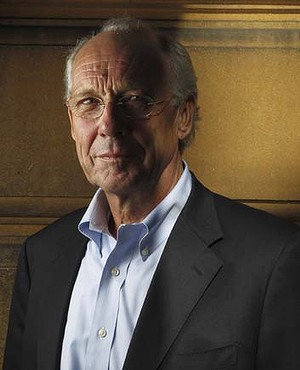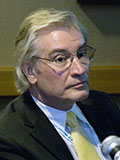About conference
The 5th national FISA conference is held on 15-16 January 2016 in Rantasipi Aulanko hotel in Hämeenlinna. The conference strives to provide a comprehensive, current and multidisciplinary look into Finnish international relations research, and to bring together researchers in different stages of their careers, other professionals, as well as people interested in the subject.
The conference is arranged in collaboration with the Ministry of Defence, Ministry of Foreign Affairs of Finland, The Finnish Institute of International Affairs and the University of Helsinki Network for European Studies.
The theme of the conference is future and forecasting. These topics will be discussed in the plenary and panel sessions. There are also sessions dedicated to discussing the future of international studies as a research area.
The conference is aimed at anyone working with issues of international relations in academia, state administration or third sector. We are no longer accepting submissions, but it is possible to participate in the conference as audience.
For more information, click ”KATSE 2016” from the menu bar and see the menu under ”FISA conference in English”.

Program
Friday 15 January 2016
| 11:20 | Bus transportation from Hämeenlinna railway station to the conference venue |
| 12:00 | Arrival and lunch |
| 13:00-15:15 | Opening remarks and keynote lectures |
| 15:15-15:45 | Coffee break |
| 15:45-17:15 | Panel sessions 1 |
| 17:15-18:15 | Future of international relations sessions |
| 18:15-20:00 | Possibility to visit the spa |
| 20:00 | Dinner |
Saturday 16 January 2016
| 09:00-10:30 | Panel sessions 2 |
| 10:30-10:45 | Break |
| 10:45-12:15 | Panel sessions 3 |
| 12:15-13:15 | Lunch |
| 13:15-14:45 | Plenum: Discussion about research on future and forecasting |
| 15:15 | Bus transportation to Hämeenlinna railway station |
Keynotes
Jorgen Randers (born 1945) is professor of climate strategy at the Norwegian Business School, where he works on climate and energy issues, scenario analysis and system dynamics. He lectures widely at home and abroad on sustainable development issues – particularly on the future and climate change – for all types of corporate and non-corporate audiences.
Jorgen Randers has spent one third of his life in academia, one third in business and on third in the NGO world. He is non-executive member of several corporate boards in Norway, including the state owned Postal Service. He also sits on the sustainability council of The Dow Chemical Company in the US and Astra Zeneca in the UK.
He was President of the Norwegian Business School BI 1981 – 89, and Deputy Director General of WWF International (World Wide Fund for Nature) in Switzerland 1994 – 99. He chaired the Commission on Low Greenhouse Gas Emissions who reported in 2006 to the Norwegian cabinet on how Norway can cut is climate gas emissions by two thirds by 2050.
He has written a number of books and scientific papers. He co-authored The Limits to Growth in 1972 and its sequels in 1992 and 2004. In 2012 he published 2052 – A Global Forecast for the Next Forty Years, which is now available in 8 languages in more than 100.000 copies.
He has received many prizes and awards, including an honorary doctorate from the Anglia Ruskin University in Cambridge UK. He is a full member of the Club of Rome.
Jorgen Randers’ personal website
Jerome C. Glenn is the co-founder (1996) and director of The Millennium Project (on global futures research) and co-author with Ted Gordon of the annual State of the Future of the Millennium Project for the past twelve years. He was the Washington, DC representative for the United Nations University as executive director of the American Council for the UNU 1988-2007.
He has over 35 years of Futures Research experience working for governments, international organizations, and private industry in Science & Technology Policy, Environmental Security, Economics, Education, Defense, Space, Futures Research Methodology, International Telecommunications, and Decision Support Systems with the Committee for the Future, Hudson Institute, Future Options Room, and the Millennium Project. He has addressed or keynoted conferences for over 300 government departments, universities, NGOs, UN organizations, and/or corporations around the world on a variety of future-oriented topics.
Recent research includes: Future Elements of the Next Global Economy, Global Energy Collective Intelligence, National Future Strategy Units, Future Education and Learning Possibilities by 2030, Global Energy Scenarios for 2020, the Future of Ethics, 2025 Science and Technology Scenarios, Middle East Peace Scenarios, and Military R&D Priorities to Reduce Health and Environmental Impacts of Nantotechnolgy.
Glenn was the Deputy Director of Partnership for Productivity International involved in national strategic planning, institutional design, training, and evaluation in economic development in Africa, the Middle East, Asia, the Caribbean, and Latin America and created CARINET in 1983 as the leading computer network in the developing world subsequently bought by CGNet. He has been an independent consultant for the World Bank, UNDP, UNU, UNESCO, FAO, UNEP, US/EPA, USAID, and several governments and corporations.
He invented the ”Futures Wheel” a futures assessment technique, Futuristic Curriculum Development, and concepts such as conscious-technology, transinstutions, tele-nations, management by understanding, definition of environmental security, feminine brain drain, just-in-time knowledge and learning, information warfare, feelysis, nodes as a management concept for interconnecting global and local views and actions, and coined the term futuring in 1973. Saturday Review named him among the most unusually gifted leaders of America for his pioneering work in Tropical Medicine (national Leprosy system while a Peace Corp Volunteer), Future-Oriented Education, and Participatory Decision Making Systems in 1974. He was instrumental in naming the first Space Shuttle the Enterprise and banning the first space weapon (FOBS) in SALT II.
He has published over 100 future-oriented articles in such as the Nikkei, ADWEEK, International Tribune, LEADERS, New York Times, McGraw-Hill’s Contemporary Learning Series, Current, Royal Society of Arts (RSA) Journal, Foresight, Futures, Technological Forecasting, Futures Research Quarterly, and The Futurist. He is editor of Futures Research Methodology versions 1.0 and 2.0, author of Future Mind: Merging the Mystical and the Technological in the 21st Century (1989 & 1994), Linking the Future: Findhorn, Auroville, Arcosanti (1979), and co-author of Space Trek: The Endless Migration (1978 & 1979).
Glenn has a BA in philosophy from American University, an MA in Teaching Social Science – Futuristics from Antioch Graduate School of Education (now Antioch University New England), and was a doctoral candidate in general futures research at the University of Massachusetts. He received the Donella Meadows Metal, Kondratieff Metal, Emerald Citation of Excellence, honorary professorship and doctor’s degrees from two universities in South America (Universidad Ricardo Palma and Universidad Franz Tamayo) and is a leading boomerang stunt man.
Jerome C. Glenn’s personal website
Plenum
The final session of the conference focuses on the challenges and possibilities of future studies. The session starts with presentations by Prof. Heikki Patomäki (University of Helsinki), researcher Leena Ilmola (International Institute for Applied Systems Analysis), Prof. Hiski Haukkala (University of Tampere/Ministry of Foreign Affairs) and Aleksi Neuvonen (Demos Helsinki). The plenum will be chaired by Prof. Henri Vogt (University of Turku).
Hiski Haukkala is an Associate Professor of International Relations at the School of Management at the University of Tampere, Finland, and a Special Adviser at the Unit for Policy Planning and Research at the Ministry for Foreign Affairs of Finland. He has also worked at the Finnish Institute of International Affairs and the University of Turku and held visiting positions at the EU Institute of Security Studies (Paris), the IISS (London) as well as the Department of Politics, University of Stirling (Scotland). He is the author of numerous articles on EU foreign policy and his most recent work is an edited collection with Routledge: National Perspectives on Russia: European Foreign Policy in the Making? (together with Maxine David and Jackie Gower). www.hiskihaukkala.net
Leena Ilmola Senior Research Scholar, International Institute for Applied Systems Analysis
Aleksi Neuvonen is the co-founder and head of research at the Nordic think tank Demos Helsinki. His academic background is in futures studies and innovation research. At Demos Helsinki Neuvonen has completed tens of future forecasting projects, varying from scenario reports for European Commission research projects, to workshops on megatrends for NGOs, cities, ministries and corporations. The most important outcome of these projects are several scenario reports aimed at the general public and a book on the subject. Before Demos Helsinki Neuvonen has worked for example at VTT Technical Research Centre of Finland, the Finland Futures Research Centre of Turku School of Economics, and taught futures studies in six different universities in Europe. He has a Master’s Degree from University of Helsinki and is currently working on his doctoral dissertation on futures research and community planning at Tampere University of Technology and Radboud University Nijmegen.
Heikki Patomäki is Professor of World Politics at the University of Helsinki, Finland. His most recent books include Suomen talouspolitiikan tulevaisuus [The Future of Finnish Economic Policy, 2015]; Tulevaisuuden politiikkaa [Future Politics, 2013]; The Great Eurozone Disaster: From Crisis to Global New Deal (2013) and The Political Economy of Global Security. War, Future Crises and Changes in Global Governance (2008). Patomäki’s research has been increasingly focusing on the future, as also exemplified by many of his theoretical and methodological papers such as “On the Complexities of Time and Temporality: Implications for World History and Global Futures”, published in the Australian Journal of Politics and History in 2011. Previously, Patomäki has worked as Professor of World Politics and Economy at the Nottingham Trent University, UK (1998-2003), and at RMIT University, Melbourne, Australia (2007-2010). In 2012 he was a Visiting Professor at the Ritsumeikan University in Kyoto, Japan. Patomäki has participated in many movements and organizations; about his activist side, see www.patomaki.fi.
Henri Vogt is Professor of International Politics at the University of Turku. In his research, he has concentrated, inter alia, on Finnish and European foreign policies and problems of democratisation and globalisation.
Panels
Työryhmäsessio I / Panel session I
Kansainväliset suhteet ja strateginen ennakointi 1 / International relations and strategic foresight 1
Chair: Hiski Haukkala
• Janne Malkki: The Future Prospects of War, Structural Changes Affecting the Longue Durée and their Impact on Balances of Power
• Pami Aalto & Iida Jaakkola: Global Megatrends and Nordic Energy Security 2030 (Paperin esittää/paper presented by Pami Aalto)
• Tapio Juntunen & Ari-Elmeri Hyvönen: Sopeutuva resilienssi: ennakoimattomuuden illuusio ja varautumisajattelun politiikka (Paperin esittää/paper presented by Tapio Juntunen)
• Minna Jokela: Rajaturvallisuuden toimintaympäristön muutosten ennakoiminen
Identiteetti, uskonto ja nationalismi / Identity, religion and nationalism
Chair: Henri Vogt
• Matti Jutila: Societal securitization: expanding the agenda for the study of extreme identity politics
• Elina Sinkkonen & Veera Laine: Legitimacy and state-led nationalism in China and Russia
• Marja Vuorinen: Breivikin manifesti revisited: uhkakuvat neljä vuotta myöhemmin
• Yên Mai & Sofia Laine: Young educated and global woman in an authoritarian society and the counter power of art
• Aini Linjakumpu: Uskontojen uusjako: karismaattinen kristillisyys islamilaisessa maailmassa
Euroopan unioni, turvallisuus ja maailmanpolitiikka 1 / European Union, security and world politics 1
Chair: Hanna Ojanen
• Sonja Alapiha: The European External Action Service as a diplomatic actor and its political significance in relation to the EU Member States’ diplomacies
• Kristi Raik: Liberalism, geopolitics and identity in EU-Russia relations: Re-reading the Baltic factor
• Niklas Helwig: Reassessing Germany’s role in EU foreign policy: from reluctant hegemon to pragmatic leader?
• Mirva Salminen & Maria Mekri: Future of European Union Crisis Management: Finding Potentials for Enhancing Capabilities through Collaboration (Paper presented by Maria Mekri)
Ulkopolitiikan historia ja teoria 1 / History and theories of foreign policy 1
Chair: Tuomas Forsberg
• Ville Sinkkonen: The trust-peace nexus and the levels of trust: The case of the United States-Egypt relationship in the post-Arab Spring frame
• Leena Riska-Campbell: Bridge Building on the Offensive. Epistemic Control of the Cold War Concepts of Modernization
• Anne Nykänen: ”Wir schaffen das” – Merkel, Germany and Europe’s Migrant Crisis
• Teemu Rantanen: Belief Systems in International Relations
• Matti Pesu: Matalalla profiililla: Mauno Koiviston ulkopolitiikan luonteeseen ja toimintatapoihin liittyvät uskomukset
Normit, oikeus ja moraali 1 / Norms, justice and morality 1
Chair: Jarna Petman
• Hanna-Mari Kivistö: Refugees, human rights and (non-)citizenship
• Saila Heinikoski: Spheres of justice in international relations: Moral theories and state sovereignty
• Katja Creutz: Morality and Law in the Refugee Crisis: Conflict or Convergence?
• Pinja Lehtonen & Anne-Marie Oostveen: Independent mobility: accessibility of European automated border control systems for persons with disabilities
• Milka Sormunen: The European Court of Human Rights as an administrator of the best interests of the child
Rauhanvälitys ja konfliktinratkaisu 1 / Peace mediation and conflict resolution 1
Chair: Tarja Väyrynen
• Jyrki Ruohomäki: Searching for narrative sympathy in Northern Ireland
• Marko Lehti: From Antagonism to Agonistic Peace: Rethinking Identities and Dialogic Transformation
• Pertti Joenniemi: Settling Conflicts Through Dialogue: A Theorization
• Tanja Tamminen: Critical approach to frozen conflicts: Through ‘diagnosis’ to transformative ‘therapy’
• Karim Maiche: Asymmetric Civic Acts of Autonomous Trade Unions in Algeria
Sodankäynti ja poliittinen väkivalta 1 / Warfare and political violence 1
Chair: Tommi Koivula
• Hanna Smith: Strategic Thinking, Strategy and Ideology in Russian Foreign and Security Policy
• Bettina Renz: Beyond Label: Hybrid Warfare
• Anna Kronlund: The changing nature of war and war powers Implications for the US political discussions
• Katri Pynnönniemi: Russian adjusted military doctrine: What it can tell us about Russian view on future conflicts?
Kansainvälisen politiikan teoriat / Theories of international relations
Chair: Hannes Peltonen
• Ari-Elmeri Hyvönen: Rethinking ”Events” in Global Politics
• Malgorzata Smieszek: Role of formal leadership in soft-law institutions on example of the Arctic Council
• Jyrki Käkönen: Kautilya ja kansainvälinen politiikka
Työryhmäsessio II / Panel session II
Biopolitiikka ja kansainväliset suhteet / Biopolitics and international relations
Chair: Jaakko Ailio
• Cai Weaver: From Sodomy and Sin, to Prohibition and Silence: The Deployment of (homo)sexuality in Russia
• Rune Saugmann: Citizen video in world politics: sight, foresight and algorithms
• Ilari Nikula: Biopolitics of the environmental crisis
• Sandra Wallenius-Korkalo: Power of the Body in Political Representations of a Religious Community
• Jemima Repo: The Sexual Politics of Human Capital Theory
Aseriisunta / Disarmament
Chairs: Tytti Erästö & Matti Jutila
• Unto Vesa: Suomen aseidenriisuntapolitiikan historia
• Tapio Juntunen: Suomen ulkopolitiikka, INF-sopimus ja tulkinnat suurvaltojen ydinasepolitiikan muutosten luonteesta kylmän sodan päättymisen yhteydessä
• Sia Spiliopoulou Åkermark: The meaning of airspace sovereignty today: challenges flowing from the Agreement on the Establishment of the North European Functional Airspace Block (NEFAB)
• Juha Vuori: Deterrence as a speech act
Euroopan unioni, turvallisuus ja maailmanpolitiikka 2 / European Union, security and world politics 2
Chair: Hanna Ojanen
• Salla Huikuri: The European Union and the Arms Trade Treaty
• Hanna Tuominen: External perceptions of the EU’s normative power role in human rights
• Tommi Koivula: The European Union and the Use of Military Force: Mapping the Discursive Space of the EU Common Security and Defence Policy
• Heino Nyyssönen: Miksi EU:n itäiset maat eivät halua pakolaisia?
Kansainväliset suhteet ja strateginen ennakointi 2 / International relations and strategic foresight 2
Chair: Hiski Haukkala
• Kari Möttölä: Obama’s grand strategy as legacy – a case study in strategic foresight
• Mikko Tyrväinen: Politique étrangère and the French European Defence Discourse – Discourse Theory as a Tool for Strategic Forecast of European Security
• Elina Eloranta: Four modes’ perspective into the recent development of Europe’s security environment
Kansainvälinen poliittinen talous 1 / International political economy 1
Chair: Mikael Wigell
• Anni Kangas: Global Cities and the Fabrication of the World
• Suvi Kansikas: Neuvostoliitto ja sosialistisen kaupan romahdus
• Sami Torssonen: Transparency and the Marxian Critique of Political Economy
Kehitysmaatutkimus / Development studies
Chair: Barry Gills
• Tiina Seppälä: Feminization of Resistance in the Global South: Challenging the Development-Power/Knowledge Nexus through Decolonial Feminist Solidarity
• Ilona Steiler: Workers’ rights in the informal economy: the paradoxes of formalization and legal empowerment for street vendors in Dar es Salaam
• Heli Aaltonen: State, churches and violence in El Salvador
• Anisa Doty: Working Around, In and On Conflict: Findings of a study of Finnish Development Intervention in Conflict-Affected Nepal
Suomi ja Eurooppa / Finland and Europe
Chair: Raimo Väyrynen
• Pauli Heikkilä: Itsenäisenä Eurooppaan. Suomen pitkä linja Euroopan yhdentymiseen
• Johanna Rainio-Niemi: Cold War Neutrality: Definitions and A New European Perspective
• Tuomas Forsberg & Matti Pesu: The Role of Public Opinion in Finland’s Foreign and Security Policy
Työryhmäsessio III / Panel session III
Rauhanvälitys ja konfliktinratkaisu 2 / Peace mediation and conflict resolution 2
Chair: Tarja Väyrynen
• Tiina Vaittinen: Hoiva transnationaalina rauhan- ja konfliktin kysymyksenä: Feministinen näkökulma /Care as a transnational question of peace and conflict: A feminist perspective
• Miia Huttunen: UNESCO and Conflict Prevention – The East-West Major Project and the Threat of an East-West Conflict
• Leena Vastapuu: Female war veterans’ everyday survival strategies in post-conflict Liberia
• Tarja Seppä: Conflict prevention and mass atrocity prevention: Responsibility to protect as a framework for prevention
• Yannick Poullie: Åland’s demilitarised and neutralised status as a matter of parliamentary discussion in Åland and Finland from 1989 to 1995
Pohjoiset alueet ja kansainväliset suhteet / Northern areas and international relations
Chair: Aini Linjakumpu
• Teemu Palosaari: The Arctic Paradox (and how to solve it.) Oil, gas and climate change ethics in the Arctic
• Juha Käpylä & Harri Mikkola: The Arctic as an exceptional zone of peace and cooperation? A Critical Analysis
• Monica Tennberg: Sopeutumisen vaihtoehdot Barentsin alueella: miten kääntää arvioinnin tulokset käyttökelpoiseksi tiedoksi?
• Nina Tynkkynen: Contested securities in the Arctic: the case of the Arctic Sunrise
• Joonas Vola: Arcticulating Aesthethics – Politics and Practices in Representing the Northern Regions
Normit, oikeus ja moraali 2 / Norms, justice and morality 2
Chair: Jarna Petman
• Lauri Tähtinen: Mitä meidän pitäisi ymmärtää luonnonoikeudesta?
• Ukri Soirila: Legitimacy and Life: Some critical notes on humanity discourse in international law
• Rotem Giladi: Race, Humanity, and the Laws of War in the Aftermath of WWI
• Ilona Steiler: After labour rights? The conception of governing corporate power in the UN Guiding Principles on Business and Human Rights
Kansainvälinen poliittinen talous 2 / International political economy 2
Chair: Mikael Wigell
• Mikael Mattlin: China’s OBOR Plan Seen Through Three Geoeconomic Lenses
• Laura Häyhä: Future prospects of China’s industrial sector and sustainable development
• Silke Trommer: Does The WTO Have A Future? Some Responses from the Trade Policy Community
Ulkopolitiikan historia ja teoria 2 / History and theories of foreign policy 2
Chair: Tuomas Forsberg
• Tapio Juntunen: Acquiescence as the fate of small state foreign policy? The uneasy reappearance of Finlandization during the Ukraine crisis
• Antto Vihma: Geopolitics versus Geoeconomics
• Antti Kaski: A European Economic Powerhouse or a Global Player? Germany’s role in the Russia-Ukraine crisis: the End of Ostpolitik or the Beginning of a New Active Foreign Policy?
• Pallavi Pal: Russian nuclear energy diplomacy in Finland and Hungary (Paperin esittää/paper presented by Heino Nyyssönen)
Sodankäynti ja poliittinen väkivalta 2 / Warfare and political violence 2
Chair: Tommi Koivula
• Mikko Räkköläinen: Outsourced Foreign Policy: The Policy Impact of Commercial Military Service Providers
• Antti Seppo: German way of war? Continuity and change in German strategic culture after the end of the Cold War
• Mirva Salminen: Strategic Partners of the Finnish Defence Forces as Producers of National Security
Maailmanpolitiikan uudet avaukset / New directions in world politics
Chair: Saara Särmä
• Mikko Mäki: The Formation of Contemporary Political Subjectivities within Islam-related and Art-related Contemporary Architecture in Qatar and the UAE
• Susanna Hast: Taideperusteinen menetelmä ja performatiivinen politiikka kansainvälisten suhteiden tutkimuksessa
• Angel Iglesias Ortiz: Visions of the world through contingency and hegemony. A visual analysis of discourses on world order, peace, and community
• Aino Huxley: Digitalisation of the International Arena: a Case Study of Youth Forums in Russia
Future of international studies
During the conference, we have received time to discuss various topics related to the current state and future of international relations research. Below you can find a list of confirmed sessions.
Feminist workshop
This workshop focuses on experiences and survival strategies of feminist researchers in academic working life – without forgetting the healing power of humour. The workshop is informal, collective and multilingual. Pre-workshop reading material (1 article) will be sent to those who register by 15 December 2015 by sending email to saara.sarma@uta.fi and marjaana.jauhola@helsinki.fi.
Research and policy making
How can research support policy-making? What kind of research is useful for the policy-makers, what kind of challenges are related to policy-oriented research, both from the reseachers’ and end users’ perspectives? The session includes also an introduction to the funding instruments of the Strategic Research Council and the Council of State. Introduction by Juha Martelius from the Ministry of Defence and Taina Kulmala from the Prime Minister’s Office. You don’t need to register in to the session.
Other ideas?
Is there something else that you wish to discuss with the conference participants? It is possible to suggest other sessions by contacting Leena Malkki (leena.malkki@helsinki.fi).
Arriving to aulanko
There will be a bus transportation from Hämeenlinna railway station to the conference venue. The schedule is as follows:
- Friday 15 January at 11:20 Hämeenlinna railway station – Rantasipi Aulanko
- Saturday 16 January at 15:15 Rantasipi Aulanko – Hämeenlinna railway station
The participants are asked to inform whether they need the bus transport when they register to the conference. This helps us in arranging the transportation.
It is also possible to arrive to the conference with your own car. There is plenty of parking space available.
The following trains will run to Hämeenlinna on Friday 5.1.:
From Helsinki
10:06 Helsinki – 11:09 Hämeenlinna
From Tampere
10:07 Tampere – 10:47 Hämeenlinna
From Turku
09:05 Turku – 10:23 Toijala / 10:28 Toijala – 10:47 Hämeenlinna
Please confirm the timetables again closer to the date to make sure there have been no changes. You can check the timetables on the national railway service’s site.
Registration and participation fee
Registration
In order to register for the conference:
- Fill in the electronic registration form.
- Pay the conference fee to the bank account of FISA (Danske Bank FI74 8000 1570 2405 73). Information about the conference fees below.
- Your registration is completed only when you have completed both of these steps.
Deadline for registration and conference fee payment:
- Paper presenters and workshop chairs: 27 November 2015
- Participation without a paper: 27 December 2015
Conference fee
The conference fee includes the meals mentioned in the programme, bus transportation between the Hämeenlinna railway station and the conference venue (see Arrival to Aulanko) and FISA membership fee for the year 2016. For those who stay overnight in Aulanko, the fee also includes the hotel services, including e.g. breakfast, and the use of spa and gym facilities.
| 1-day participation, no accommodation | 2-day participation, accomodation in twin room | 2-day participation, accomodation in single room | |
| Paper presenters and workshop chairs – postgraduate students | 40 | 40 | 87 |
| Paper presenters and workshop chairs – others | 40 | 90 | 137 |
| Audience | 40 | 120 | 167 |
Contact information
Leena Malkki
Chair of the Finnish International Studies Association
E-mail: leena.malkki(at)helsinki.fi
Tel: +358-50-3182158
Emilia Lounela
Conference Secretary
E-mail: katsery@gmail.com
Tel: +358-294123249


